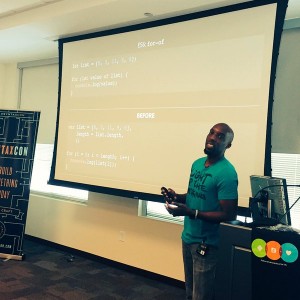Episode 55 – Ben Ilegbodu

Senior Frontend Engineer at Eventbrite
Why don’t you go ahead and tell me about yourself?
I got excited about computers at an early age. Probably early elementary school. My mom had a 286 computer that only ran DOS (pre-Windows). When she’d come home from the store, I would take the receipts and type them up in the word processor. I loved it! I learned basic DOS commands; enough to games like Math Blaster, Word Muncher, and Typing Tutor. I owe so much of my trajectory to those early moments.
I went to Stanford for my undergrad in computer science and then got my Master’s in the fifth year also in computer science. While in school I had the blessed opportunity to intern at some good companies, and that enabled me to see that I was interested in doing web development. I’ve been doing it on my own on the side projects in high school and things like that. Internships showed me that I could make a legitimate career out of it. I graduated in 2006 and then joined a company called Zazzle here in the Bay Area and worked with them for over eight years. Then recently last year, I joined Eventbrite where I came in on as a Senior UI Engineer.
What is the difference between computer sciences versus web developer?
Computer science is the series in the foundation of software development and software engineering. You learn a lot of the theory and how all the things work, whereas web development is more about actually building websites and stuff like that. So you can use computer science principles in how you build a website, and that’s how you can create a website that millions of people can use, and its fast and things like that. In school, they teach computer science but rarely do they teach web development skills. You won’t find too many universities teaching HTML and CSS and JavaScript, which you end up using a lot when you enter a web development industry.
So do you think colleges are doing it wrong then, and they should be teaching at least one useful coding language in Computer Science?
I wouldn’t say they are necessarily doing it wrong; that’s just how school seems to be. They teach all kinds of foundation and stuff like that. When you look at nearly any industry, you don’t learn the practice of it; you learn the theory behind it. Even if you’re talking about people who are pre-med and stuff like that, they’re not out working on people; they’re learning about biology and physiology, and all those kind of things. But I do think that there can be some classes, maybe not necessarily a major in it but some classes that focus on the web development, so that you can get those skills.
I think the challenges are that you have a lot of professors, and the way that you become a professor that you have to be teaching for a long time, and they’re not in the industry. So, they don’t know what’s going on right now in the web development industry. The industry is changing so fast that if you have been out of it for two or three years even, you’re going to be behind. So, you need people who are in the industry now, like somebody myself or anybody in the industry to go and teach a class at a school. There just not that many people who are willing to do that or have the time or the ability to do that. I think that’s where the disconnect is happening.
What was your perception of the tech industry before you stepped into it? Before entry and now?
Facebook started when I was a sophomore in college, and by the time I was a senior in college, there were people leaving school early, not graduating, to join Facebook and jump on that train, both as software engineers as well as individuals who were helping with customer support and stuff like that. And then apparently companies like Google and Yahoo also came out of Stanford so that you could see this aura or this start-up culture, and all these great companies were coming out of it.
So, I joined the start-up, Zazzle, and just imagined entering that train and thinking that tech was all about doing cool stuff, and making a lot of money doing it. And now looking at it, it’s not as glamorous. The outside perception seems more exciting than inside. The rose colored glasses are off. I do enjoy what I do; it just doesn’t have that superstar sense.
What is your favorite part about what you do, and what is the challenging part?
My favorite part is being able to send a link to my mom, and say hey this is what I was working on; this is what’s been occupying my last four months or six months or the last year. This is the company that I work for, and I can show her the website, and it makes sense. I think just that visual aspect of it is something that’s unique to computer science. A lot of computer scientists are people who do programming behind the scenes; there’s no visual thing that you can point to people, but just the fact that it’s on the web and I can show people what I worked on is cool.
 And then the part of the same coin of that is that working at Eventbrite primarily; I go to a lot of conferences, and I speak at conferences now. And those conferences use Eventbrite to sell their tickets. So, just the fact that the people, the attendees at the conference are there because they used the website that I helped build is cool, it’s pretty rewarding in that regard. As far as the challenges are concerned, I think the biggest problem is just always having more things to do than time to do it. There is always ideas and ambitions that we have as a company, that I have as a person to get better, and there’s just not enough time in the day to do it, and finding the balance not to work myself to death to accomplish all of it is the biggest challenge. Because I have a family, I have a wife, I have a daughter now, and one on the way. It’s like I want to be there for my family, I don’t want just to be out working all the time, to “provide” for them, but I want to be with them and spend time with them. So, finding that time and not feeling guilty on either side, feeling guilty when I leave work because I want to be with my family, or feeling guilty that I have to leave my family to go to work.
And then the part of the same coin of that is that working at Eventbrite primarily; I go to a lot of conferences, and I speak at conferences now. And those conferences use Eventbrite to sell their tickets. So, just the fact that the people, the attendees at the conference are there because they used the website that I helped build is cool, it’s pretty rewarding in that regard. As far as the challenges are concerned, I think the biggest problem is just always having more things to do than time to do it. There is always ideas and ambitions that we have as a company, that I have as a person to get better, and there’s just not enough time in the day to do it, and finding the balance not to work myself to death to accomplish all of it is the biggest challenge. Because I have a family, I have a wife, I have a daughter now, and one on the way. It’s like I want to be there for my family, I don’t want just to be out working all the time, to “provide” for them, but I want to be with them and spend time with them. So, finding that time and not feeling guilty on either side, feeling guilty when I leave work because I want to be with my family, or feeling guilty that I have to leave my family to go to work.
Well, congratulations on your family having one on the way.
Thank you.
 How old is your daughter?
How old is your daughter?
My daughter is a little over two years old and a couple of months.
Have you been showing her code.org, and trying to get into programming?
Not yet. But she does like when I work from home and sitting on my laptop and typing the keyboard, and stuff like that. I do want to get her involved in that as well, to get her loving computers from the get go, in programming especially.
That’s wonderful! What do you think that parents can do to increase their child’s interests in learning how to program versus just using technology?
That is the million dollar question for myself. My daughter loves using technology; she knows how to use our phones and tablets. It’s amazing what she’s able to do, even though she can’t articulate what she’s doing, just the pattern recognition, being able to swipe and click this picture, and this screen button does that, this x closes an ad. She knows how to do all that stuff, she’s only two, which is just mind boggling. I think it’s just kids tend to like what their parents are doing, in general, they want to be around them while they’re doing it.
I think I have the advantage of already being in tech and doing coding that is sadly just can start to show her what I’m doing and apparently introduce her to stuff like code.org and that kind of programs as well. I just don’t know how, like I am at such a high level of what I’m doing in coding, trying to figure out how to get to first basics, and how to teach her that way, because I’ve forgotten how I even learned in the first place. I don’t remember what the first thing was that I heard about in how to code, it’s been such a long time. I’ve been doing it for a long time, so I’m going to be figuring it out in the next couple of years. I don’t know if I have any nuggets of wisdom yet to share in that regard, you’ll have to check back.
What would you say to students who are starting out, regardless of age, on how to become risk takers?
That’s a good question because it’s like I’m looking back at myself when I tried to ask myself was I a risk taker or not. And part of me says yes, I was basically on my own especially in high school. I played basketball, so I had a lot of friends in basketball, and made things through basketball but other than that I was pretty much a typical nerd. So, there weren’t many friends, and I was in the advanced classes and stuff like that, and I was one of maybe two or three, at best, people of color especially African-Americans. So, doing things like computer science I was the only person, and pretty much always been the only black person in whatever arena that I’m in, but yet I was still Ok with that. Even though back then friends would make fun of me, jokingly in a friendly way say, Ben’s going to study or been doing this and that regarding school. But yet I still went and did it.
So, I guess I didn’t quit because of it, so I was taking risks regarding maintaining friendships. But I think the reason that I continued to do it, and why I didn’t mind being alone in doing it is because I think that’s my natural personality. I think that when I look at the type of people now that are in web development and like to do it for a living, they aren’t the people who need to be out and talking to people, and socializing, they don’t need to be extroverts. It’s a lot harder for extroverts to succeed because a lot of programming is sitting in front of your computer and working through stuff. So, I think it was a personality trait, so if you have a character trait of being a risk taker but then also you are comfortable being in by yourself. You don’t have to be around people to feel comfortable or to feel happy about yourself, or something like that. I get energized, and I find comfort in just being by myself and watching TV, or being myself and working on a project and stuff like that. I think those two things tie in together for having success in that area.
My final question is, what are the three tips that you could give to someone who wants to enter tech, and specifically who seeks to be a developer?
Let’s see, three tips. I already gave the first one, just be who you are. I guess it’s like what are your motivations for doing it because I was just reading an article today about boot camps and all the boot camps out there. And how people are going to these boot camps because everyone should know how to code because there’s money in coding. If that’s your motivation, it’s going to be difficult; you can still persevere like people do all kinds of stuff solely for money. I don’t think that person’s going to find joy and satisfaction out of it, that’s not really what they want to do. You have to have a particular personality and demeanor/disposition to enjoy it on a day to day basis.
Number one is, what your motivation is, make sure the motivation is right. Another tip, I would say is especially for someone of color is sadly just be OK with being the only one. When I look at my computer science classes in high school, my degree program at Stanford, working in industry, internships, I was always one of two, or the only one. I don’t think I ever really had an experience of being treated like the black person, or the black guy or anything like that. I think I have been blessed to have the opportunity to have pretty decent co-workers, but it’s still obvious, and it comes out in other ways, like what people like to do and things like that. So, just not having that kind of area of commonality with my co-workers. And then as a result of being OK with being the only one is that feeling of also being the representative. I always, whether this was real or not, always felt like I was representing black people wherever I was in work. I didn’t want to believe any stereotypes; I always try to break stereotypes.
I’m probably the first black person that a lot of my co-workers have met who is a software engineer and showing that it is possible, that you can do it. Since we’re still so rare, they’re not enough people of color doing it that’s going to be a reality, unfortunately. I think for the most part I’ve been able to handle that responsibility, maybe it’s self-imposed, maybe it’s real, but that’s another thing. I think that has tested out to me and important for them to know. And then the third tip is to start as early as possible. If you have an opportunity to take a class especially in school, just take it to see it. It’s a lot easier to do it, the younger you are, I would say, than later you have more responsibilities and trying to change jobs it’s a lot harder than to get up earlier.



